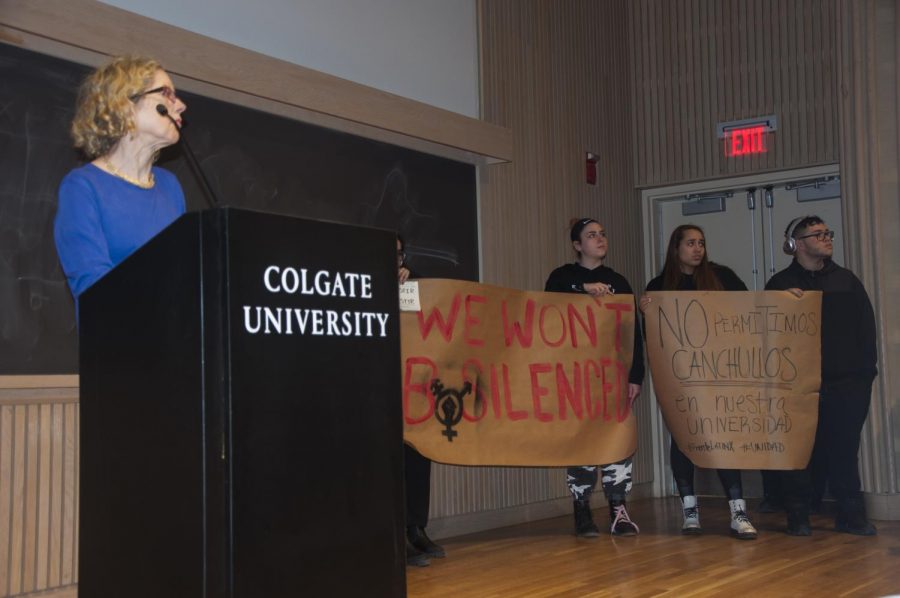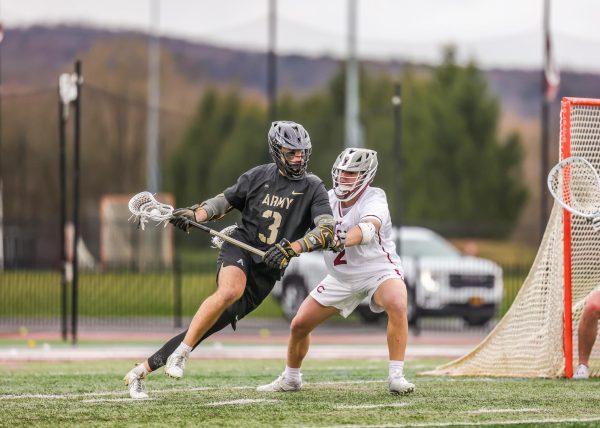Mac Donald Faces Protesters at “Diversity Delusion” Lecture
Conservative author and commentator Heather Mac Donald in front of protesters at her lecture. These two signs were one of about six large signs that went up in the crowd during the Q&A section of the lecture, along with smaller posters.
Conservative author and commentator Heather Mac Donald faced protestors at an overfilled Love Auditorium for her lecture on free speech and the “diversity delusion” on college campuses last Thursday, Feb. 20.
Mac Donald argued that the current “campus and political left” have a monopoly on the definition of “hate speech,” which they then use in an effort to restrict free speech for those with opinions that veer from the left. This censorship is used to perpetuate what she calls the “diversity delusion,” or the “campus left’s” obsession with identity politics.
“Censorship is the natural result of the paramount mission of today’s university: assigning guilt and innocence in the ruthlessly competitive totem pole of victimhood. Almost the entire university has been taken over by a single idea: that to be a female or a minority or one of the ever-multiplying varieties of non-binary genders in America today is to be the target of endless life-threatening bigotry,” Mac Donald said. “That bigotry is particularly acute, we are to believe, on college campuses. Female students and minorities are being taught to believe that they are quite literally under existential threat.”
Mac Donald lamented campus pushback on “core curricula,” attacking the Western canon based on identity exclusion. She invoked the works of civil rights leaders and famous Western intellectuals, claiming today’s campus culture of stifling free speech would sadden beloved Western intellectuals of color like Frederick Douglass and W.E.B. Du Bois.
Mac Donald delivered her speech in under 30 minutes before the floor was opened to the audience for Q&A. During the Q&A portion, the audience grew loud with reactions of laughter and shouts at some of Mac Donald’s answers. Many students shared personal anecdotes to address her claims that have seemingly supported racial profiling of Muslims and discredited campus rape culture. The topic of sexual assault produced the biggest response from audience members. Students also brought up Mac Donald’s historical support for controversial U.S. interrogation techniques, opinions on higher education and Colgate’s recent history of hate crimes.
Mac Donald explained why she thinks her lectures tend to devolve into this sort of chaos.
“I think that students are very emotional about their chosen victim identity, and they have not obviously heard people that are not on board with that and so it is striking to me that there does break out, often, a mass hysteria when I or other speakers who challenge that orthodoxy show up on college campus,” Mac Donald said. “It’s a strange reaction in my view but it speaks to [how] deeply held certain ideas are on college campuses.”
Senior Lecturer in Spanish Pilar Mejía-Barrera said she felt the discussion was more attention-seeking than productive.
“It feels to me that this is a type of discourse that is not productive,” Mejía-Barrera said. “I almost feel like she’s looking for that kind of… she’s trying to traumatize and to produce that kind of scandal. It’s sensationalist.”
Well over 60 students sat in the entryway of the auditorium before and throughout Mac Donald’s talk in protest; protestors wore all black and read books by “radical” authors to read in the lobby. Protestors who chose to enter the lecture were encouraged to disengage by putting in headphones, doing homework or reading a book they brought. At a table in the lobby, protesters had a printed copy of the Colgate Diversity, Equity, and Inclusion Plan and a flier for a Black Lives Matter Fundraiser in Syracuse. Before the lecture, protestors circulated an opposition statement that Mac Donald requested access to via Google Docs the day of her lecture. 485 students signed the opposition statement before Mac Donald arrived on campus.
“My beliefs and values do not align with Heather Mac Donald’s beliefs and values. I believe that it is an exercise of my free speech to disagree with and express dissent against the opinions and statements posed by Heather Mac Donald. I believe individuals and institutions should work to support people who hold marginalized identities. I do not think Colgate should have given Heather Mac Donald money to preach rhetoric harmful to people of color and survivors of sexual violence,” the statement read.
When the Q&A section began, protestors displayed six massive signs around the perimeter of the auditorium and many smaller ones scattered throughout. Some of the posters read: “Black Lives Matter,” “Stand with Survivors,” “Faculty in Solidarity,” information about discriminatory stop-and-frisk practices and information about the exceptionally intense wealth disparity at Colgate.
After the lecture, protesters organized a debrief session at the Center for Women’s Studies, at which first-year senator Claire Short and sophomore senator Kate Connelly explained the approval process for speakers and took notes on what attendees would like to see the Senate do in response to the controversial lecture.
First-year Pedro Martinez explained why he felt it was important to protest.
“I think when you promote outdated ideas, it’s really just under a guise of open discussion. There are plenty of right-sided people that have really coherent political conversations, but this is apolitical. It’s just bias in the truest sense. I think if you have a speaker that you couldn’t have speak [somewhere] like the ALANA Cultural Center, they probably shouldn’t be here,” Martinez said.
Senior Sumeet Saini said that though he felt people of color may have dismissed her too quickly, he was glad people stayed at the lecture to hear Mac Donald out. Wearing a red “Keep America Great” hat and sitting near the back of the crowd, Saini commented on what it meant to be a person of color in support of Mac Donald’s talk.
“I feel that both sides of the debate should be discussed and I wasn’t really too happy that a lot of people, especially people of color, were so dismissive of her coming to campus right away and didn’t want to hear her out. And so it made me a little frustrated especially because my primary identity isn’t based upon my skin color. I have a ton of interests. I like to do a lot of other stuff and I don’t identify just as an Indian. For me, I always feel like I don’t fit in with other people of color and sometimes I may even be called a “race traitor” because I don’t conform. And so the hat’s a bit of a protest but I wanted to come here to hear her out,” Saini said.
Campus Safety assigned four officers to the event, including Associate Vice President for Campus Safety, Emergency Management and Environmental Health and Safety Dan Gough. One of many protest organizers, sophomore Joanna Rodriguez, was counting attendance and counted 315 people when Campus Safety Officers first closed the doors due to overfilling the auditorium, but the audience continued to trickle in throughout the lecture; the capacity for the auditorium is 271. The lobby of Love was also full throughout the lecture. Gough said the club reached out to him requesting Campus Safety be present at the lecture; Open Discussion Club president sophomore Anthony Palazzola said he believes the lecture might have become violent without Campus Safety officers present.
Palazzola said the Open Discussion Club chose Mac Donald for her ability to speak her mind in situations where she is the minority. Palazzola said the group did not rank Mac Donald against any other potential speakers. Though there are likely speakers out there who could deliver a similar lecture, Mac Donald came to mind for members of the Open Discussion Club.
“[Mac Donald is a] courageous individual who’s not afraid to state her opinions in an atmosphere where she is by far and by large the minority opinion. She’s not a moderate for sure and we didn’t necessarily want a moderate. And from what I’ve learned…I thought that she would give a strong forceful defense of that goal that we’re following,” Palazzola said.
Palazzola said that in the aftermath of the lecture, many members of the Open Discussion Club have felt they need to keep a low profile on campus, a feeling Palazzola said was shared by some non-protesters at the lecture who did not feel comfortable asking questions that didn’t directly criticize Mac Donald. This was just one of what Palazzola said was many unfair barriers the club faced in the year-long effort to bring Mac Donald to campus. He said that while he felt disappointed by some of Mac Donald’s arguments, he felt more disappointed by some of the protesters’ techniques and had hoped the lecture would be more “civil.”
“We need to rise to a higher order of compassion for people who disagree with us because frankly that’s what Colgate expects of us, and that’s what the world expects of us if we want our polarized world to change,” Open Discussion Club Secretary Reed Cleland said.
Overall, though, Palazzola said the lecture was a success.
“I will say overall, though, the event was a win-win for free speech. Mac Donald got to make her statements, the protestors got to make their statements, I just wish it was more civil. I really do,” Palazzola said.
The talk preemptively inspired debate around campus and at a Feb. 18 Senate meeting about speaker funding. The talk, which was funded through the Budget Allocations Committee (BAC), drew from the Student Activities Fee, a 175 dollar fee included in each student’s tuition every semester. The funds from the combined fees total more than which is then apportioned to SGA-approved student groups via the BAC’s allocation process.
Mac Donald’s talk cost the BAC 5,150 dollars: 5,000 dollars towards Mac Donald’s speaking fee, 100 dollars for advertisement and 50 dollars for Buildings and Grounds. The total BAC budget for this semester was just over 500 thousand dollars. The Open Discussion Club had also initially requested an additional 250 dollars for ten people to have dinner with Mac Donald, but the BAC denied this funding on the grounds that the dinner would not be accessible to all students. Palazzola said the BAC funding covered about 75 percent of the event costs, with the remaining costs absorbed by the Department of Political Science and the Center for Western Freedom and Civilization. The Department of Political Science picked up the cost of the private dinner that the BAC had rejected.
The proposal was approved by the BAC on Nov. 17, 2019 as a pre-semester allocation. The BAC had a 15-minute meeting with the Open Discussion Club before the proposal was approved, as they do with all proposals over 1,000 dollars.
According to BAC co-Treasurer Jack Reston, the BAC judges proposals based on four criteria: fiscal responsibility, mission alignment, and quantity and quality of services. The BAC does not, though, judge proposals based on content, a practice which is standard in the University community and important given the BAC is not elected by students and, thus, not representative.
“I think that what the Senate was really concerned about was this movement to a speech that seems to run contrary to Colgate’s mission statement. So that also brings up an interesting question; BAC is not evaluating Colgate’s mission alignment but the mission alignment of the club. We don’t have a tenant on top of that [to] look at proposals as they adhere to Colgate’s mission statement,” Reston said. “In a sense, I think, at least, that would give the BAC way too much purview. One of the things we really try to do is make sure that we can quantify things…so there’s as little room as possible for us to make personal decisions.”
Before the proposal reached the BAC it was seen and passed forward by Program Coordinator for the Colgate Speaking Union and Campus Life Edie MacPherson, who is also the Open Discussion Club’s CLSI advisor. MacPherson said CLSI judges proposals based on “the feasibility and logical safety of the event and the purpose of the event in terms of making sure it fits within the mission and purpose of the club.” CLSI does not judge proposals based on content.
Mac Donald has given similar lectures this year at Emory University, UC Berkeley, Colorado University Boulder, Princeton, Bucknell and Hillsdale College.
“I’m grateful that I was allowed to finish my speech, which did not really happen at [other campuses] so I think the students were respectful during that time and that speaks well for Colgate,” Mac Donald said.
Emily Rahhal is a senior from Los Angeles, California double concentrating in Middle Eastern and Islamic Studies and Religion. She has previously worked...








Jennifer Smith • Sep 22, 2020 at 8:08 pm
I appreciate that the author reported this story straight and was able to find two students who spoke to the uncivil atmosphere in the room. I wonder how the protestors would feel if conservatives were to go on stage with banners during a speech by Bernie Sanders or another hero of theirs and constantly interrupt the speaker and ask hostile questions during Q&A. I watched the video of the session and am appalled by the lack of civility and childish antics on full display. The lack of maturity and rudeness demonstrated by some of the students is sadly normal these days, far different than my time. Despite the upbeat sentence at the end of the article, here is what Ms. Mac Donald said a few weeks after her visit:
“My Colgate experience presented a more extreme version of something I have encountered in all the campus protests against me: the questions from the protesters in the hall invariably have nothing to do with my talk,” she said.
Mac Donald described the protesters’ suggestion to effectively cover their eyes or ears during her talk as “a stunningly apt emblem of the campus left’s rejection of dialogue.” She said many questions she fielded were from a cheat sheet of her writings prepared by protest organizers.
“Not surprisingly, then, the Colgate protesters’ questions were even more out of left field than usual: a large number focused on the post 9/11 war on terror, a subject I have not written about for nearly twenty years and that I certainly did not address at Colgate.”
“… This is campus rage manufactured in order to preserve the claims of victimhood.”
Here’s hoping Colgate students can up their game and make us all proud by exhibiting maturity, civility, and an open mind when encountering opinions different than their own. That’s the purpose of a university last I checked. Good luck to all.
j. hart • Mar 27, 2023 at 8:26 pm
As a Colgate student who attended the talk, I think it’s appalling that ANYONE would support McDonald’s arguments, especially concerning victims and survivors of sexual assault, as well as torture of individuals, and racial harassment against Black and Brown individuals. The questions of civility are only brought about when people refuse to support theories and statements about oppression and dehumanization. The “what-abouts” you state only come about when you recognize the fallabilty of your argument–plenty of protests by those who disagree with people you deem radical happen–but they aren’t in the news for various reasons. I’m proud that students stepped up and had their voices heard, also supported by other students and faculty. Universities used to be sites of progressivism and pushing the envelope, but increasingly host ideas of conservatism and color-blindness–those who believe in those ideals are always under the illusion that they are consistently attacked. It’s a shame that people believe “differing opinions” cover human rights violations, dehumanization, and goverment suppression, and not ways of liberation.
Ultimately, Jennifer Smith, civility only gets you so far. When your rights are on the line, will you be civil? When someone stands in front of you, destroying your humanity, will you be civil? The civil rights leaders you may be quoting weren’t civil–they were non-violent. There is a difference–civility only serves those who benefit from your silence, invisibility, non-existence, and dehumanization.
Here’s to hoping that Colgate students can up their game and make us all proud by pushing the envelope, demanding better from their university and strive to make the world a better, more liberatory place.